Are you tired of manually writing complex R code for your data analysis and visualization needs? Well, the good news is, there’s a new kid on the block – AI-powered generators!
An R code generator is a tool or software that automates the creation of scripts or code in the R programming language. R, known for its statistical computing and graphics capabilities, is widely used in data analysis, statistical modeling, and visualization.
But how do AI-powered R code generators work? What are their limitations? And are they worth incorporating into your workflow?
In this blog post, we’ll explore the AI-powered R generator landscape in depth and provide insights into how it can help you analyze data more effectively.
Let’s dive in!
Overview of R Code Generator

If you’re a data analyst, statistician, or programmer, an AI-powered R generator can help you work more efficiently and productively.
It automates the creation of R programming code and generates customized code for specific analyses and tasks. This makes it much more convenient for you to write R code for data analysis.
Let’s take a closer look at some of the key features.
6 Key Features and Benefits:
Efficient Code Creation: Code generators simplify coding by automatically generating code structures, functions, and data manipulation tasks.
Customization and Flexibility: You can tailor generated code to your needs by adjusting parameters and options.
Error Reduction: Code generators help minimize coding and syntax mistakes, enhancing R scripts’ overall reliability and accuracy.
Accelerated Learning: If you’re a beginner, you can benefit from using code generators, which provide insights into best practices and coding conventions.
Reproducibility: Your generated code can be saved and reused for future analyses or shared with collaborators, ensuring consistent and reproducible results.
Integration with Data Sources: Many R generators connect your data sources, simplifying data retrieval, transformation, and analysis tasks.
It also empowers you to create, customize, and maintain R code efficiently, ultimately facilitating faster and more accurate decision-making.
Now, let’s see how to Generate R code.
How to Use an AI-Powered R Code Generator: 4 Real-World Examples
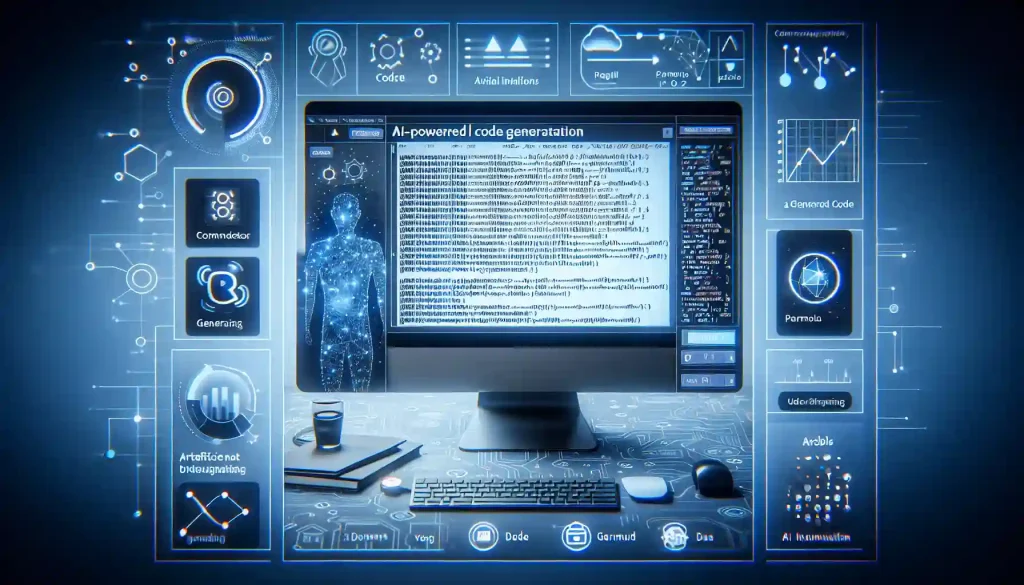
Let’s demonstrate the capabilities of these tools by using the EnterpriseDNA Code Mentor with the following examples:
Example 1: Data Visualization
User Input: “Create a bar chart to visualize product sales distribution by category.”
Generated R Code:
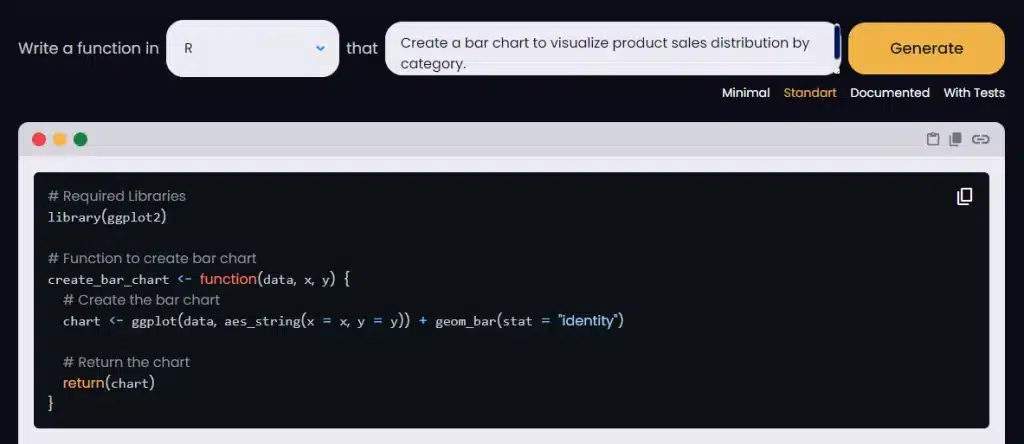
This example demonstrates how the generator can produce R code for data visualization tasks using the popular ggplot2 package.
Next, let’s take a look at statistical analysis.
Example 2: Statistical Analysis
User Input: “Perform a t-test to compare the means of two groups.”
Generated R Code:
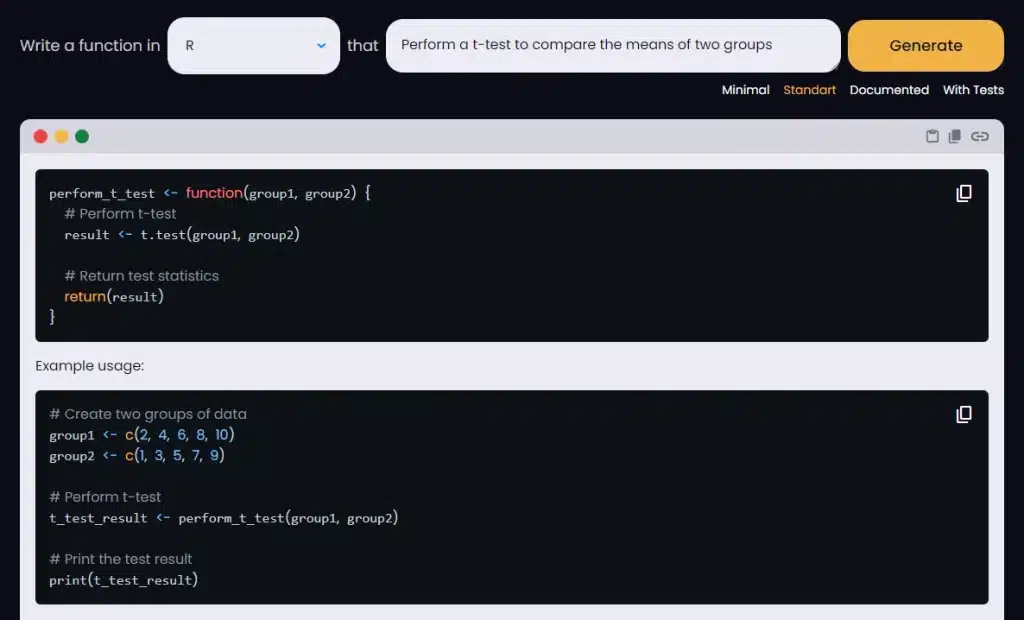
In this case, the generator generates R code for conducting a t-test, making statistical analysis more accessible.
Moving on, let’s check data cleaning and preprocessing.
Example 3: Data Cleaning and Preprocessing
User Input: “Remove missing values and normalize the dataset.”
Generated R Code:
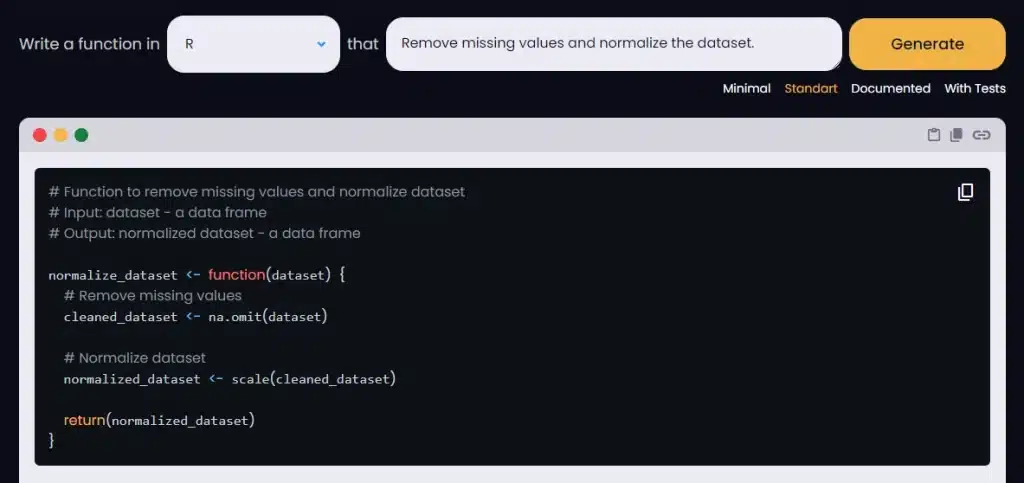
The generator can simplify data cleaning and preprocessing tasks, helping users efficiently prepare their data for analysis.
Next up, let’s make a forecast.
Example 4: Time Series Forecasting
User Input: “Forecast future monthly sales based on historical data.”
Generated R Code:
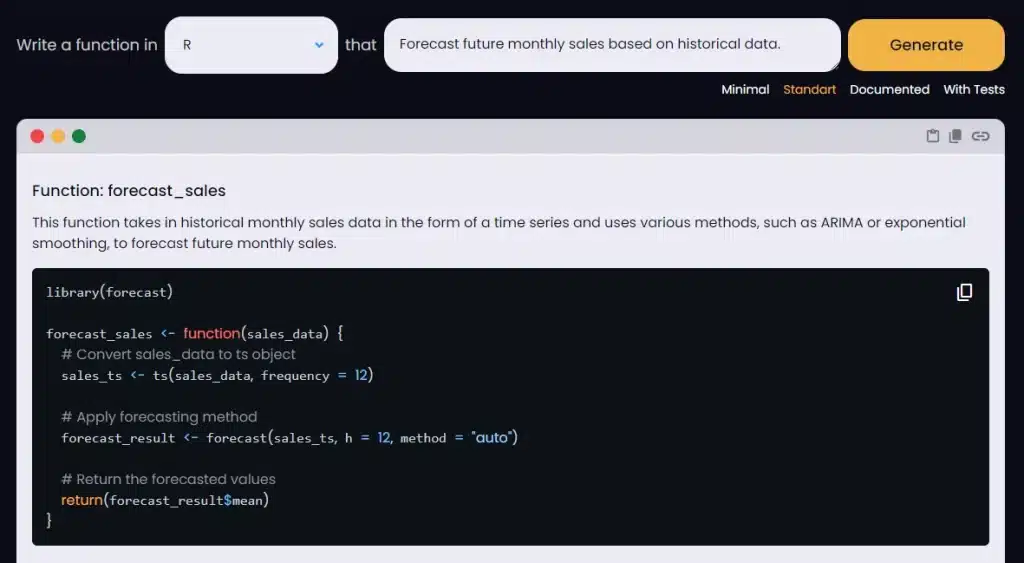
In this example, the code for time series forecasting is generated using the ‘forecast’ package, enabling users to predict future sales based on historical data.
Alright, let’s move on to crafting a function to train your very own machine-learning model!
Example 5: Machine Learning Model Training
User Input: “Train a random forest classifier to predict customer churn.”
Generated R Code:
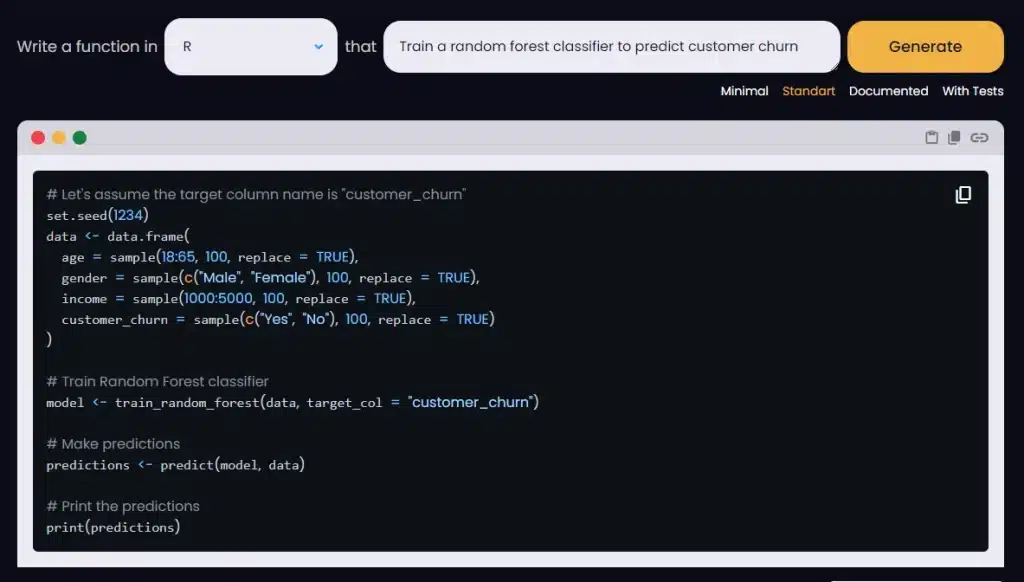
In this scenario, the generator’s output code is a script that automates training a random forest classifier for customer churn prediction, including splitting, model training, and evaluation.
These additional examples showcase the versatility in handling various tasks, making complex processes more accessible to you regardless of your level of programming expertise.
That’s it; let’s reflect on some key takeaways.
Final Thoughts

In the era of data-driven decision-making, efficient data analysis is essential for businesses and researchers.
Code generators offer a solution to expedite this process by automating the generation of R scripts based on input or natural language instructions.
These tools enhance productivity, reduce errors, and enable you to focus on deriving insights from data rather than struggling with code.
Whether you’re new to R programming or an experienced data analyst, integrating an AI-powered code generator into your toolkit can significantly improve your workflow.
As this technology continues to evolve, expect even more advanced capabilities in the future, further simplifying and accelerating your tasks.
You can explore the Colour Theme Generator app with an insightful overview on the enterprise DNA YouTube channel:
Frequently Asked Questions
What is an AI Code Generator?
AI code generators automate creating computer source code from higher-level representations, like design specifications, graphical models, or natural language descriptions.
They use AI to translate plain words into computer code, which can be used for programming and applying transformations and manipulations to the code, among other tasks.
What are the Benefits of Using Generated Code?
Benefits include time-saving, error reduction, improved code quality, maintainability, consistency, and portability. They help developers focus on higher-level tasks and ensure correct and consistent code.
Potential Drawbacks of Using Code Generation?
Code generated might be difficult to understand or modify by humans, less efficient than hand-written code, not suited for all programming tasks or environments, and may require significant resources for setup and maintenance.
Can you generate code for Testing and Debugging?
Yes, some tools can generate test cases based on specifications or auto-generate mock objects to facilitate testing and automatically generate debugging code like logging statements or error-handling code.
How do AI-driven Code Generators Differ from Traditional Ones?
AI-driven code generators leverage machine learning and natural language processing to understand your requirements and generate code, making them more versatile and accurate than traditional generators relying on predefined templates.
How Secure is it to Generate R code?
While R generators are potent tools, reviewing and validating the generated code for security best practices is essential, as AI models might only sometimes consider security implications.
How do AI Code Generators Handle Ambiguous Requirements?
They might ask for clarifications or make assumptions based on their training data. Providing clear and concise requirements is recommended for accurate code output.
Are there any Industries or Sectors Where AI Code Generation is Particularly Beneficial?
AI code generation is beneficial across various sectors, especially in web development, mobile app creation, data science, and domains requiring rapid prototyping.
Can AI Code Generators Create QR Codes?
Yes, AI code generators are capable of creating QR codes. They can generate scripts or code snippets that create QR codes based on specified data or links. These tools save time and ensure accuracy by automating QR code generation, providing a convenient solution for integrating QR codes into digital projects.









